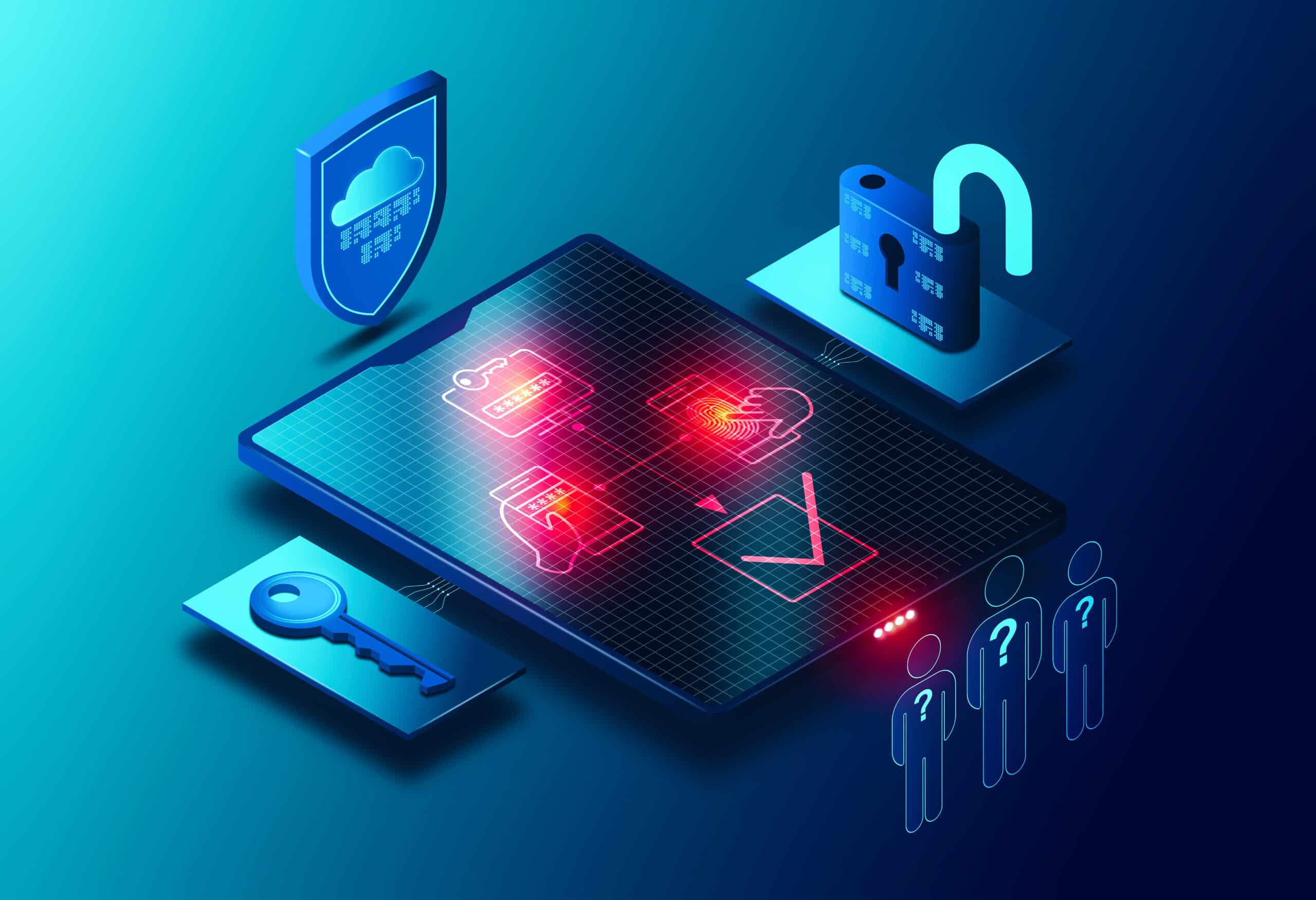Authentication Fundamentals
Cybersecurity is a big deal for UK businesses right now. With threats getting smarter, passwords aren’t enough to keep your data safe anymore or the only way to prove it's really you trying to sign in to that device.
This document outlines the importance of Multifactor Authentication (MFA2) as a fundamental security measure for UK businesses of all sizes and why it is essential to provide a second layer.
Multifactor Authentication for Business Security
Multifactor authentication enhances security by requiring multiple verification methods to establish user identity during the login process. Rather than relying solely on password protection, authentication systems incorporate additional verification factors:
- Knowledge factors: Something you know (username, app password, security questions)
- Possession factors: Something you have (mobile device, security key, SMS to your phone)
- Inherent factors: Something you are (fingerprint, face ID)
This layered authentication method significantly strengthens access security by ensuring that unauthorised access remains blocked even if one factor is compromised. Using a combination of passwords and additional verification provides much stronger protection than passwords alone.
Benefits of Multifactor Authentication
Authentication Security Benefits
Research consistently demonstrates that compromised passwords represent the primary attack vector in successful data breaches. Implementation of 2fa effectively addresses this vulnerability by:
- Preventing unauthorised access even when passwords are compromised
- Mitigating the risks associated with credential theft through data breaches
- Protecting against sophisticated phishing attempts that target login credentials
- Reducing vulnerability to brute force attacks on password systems
- Securing access to sensitive business information with multiple layers of security
Authentication Compliance Access Requirements
Multifactor authentication implementation assists UK businesses in meeting various regulatory and certification requirements:
- Cyber Essentials and Cyber Essentials Plus certification
- ISO 27001 compliance standards
- GDPR data protection obligations
- Industry-specific regulatory frameworks
Authentication for Operational Resilience
Beyond security improvements, proper authentication provides tangible operational benefits:
- Reduced system downtime from security incidents
- Enhanced protection for remote and hybrid workforce environments
- Decreased likelihood of business disruption from ransomware attacks
- Protection of intellectual property and sensitive business information
MFA Methods
Mobile Device Authentication Options
Modern authentication systems leverage mobile devices as a trusted second factor. Options include:
- Microsoft Authenticator app installation for one-tap approvals
- SMS codes are sent to your phone for verification, or OTP Codes
- Fingerprint readers on mobile devices for biometric verification
- Security key compatibility with modern mobile devices
- Alternative verification methods when mobile devices are unavailable
Authentication Implementation Considerations
When evaluating authentication solutions, businesses should consider the following for users and groups:
- Integration capabilities with existing infrastructure
- Scalability to accommodate business growth
- Administration requirements and management overhead
- Recovery procedures for lost authentication devices
- User experience impact on productivity
- Support for conditional access policies
- Sign-in process efficiency for end users
Microsoft 365 Authentication Security
For organisations utilising Microsoft 365, the implementation of multifactor authentication is particularly crucial due to:
- The platform's widespread use makes it a common target for attackers
- The extensive access privileges typically associated with Microsoft 365 accounts
- The critical nature of data stored within the Microsoft 365 environment
- Microsoft Authenticator's robust native authentication capabilities
- Compatibility with Microsoft Entra ID (formerly Azure AD) for centralised identity management
- Support for passwordless authentication options
Microsoft 365 Security Features
Microsoft 365 provides several built-in security features that complement multifactor authentication:
- Conditional access policies that require verification based on risk factors
- Microsoft Authenticator app for simplified mobile device verification
- Security key support for hardware-based authentication
- Sign-in process monitoring for suspicious activity detection
- Access management for both Microsoft and non-Microsoft applications
Authentication Implementation Services
At Silver Lining, we provide comprehensive authentication implementation services:
- Security Assessment: Thorough evaluation of current security posture and password policies
- Solution Design: Custom authentication method strategy aligned with business requirements
- Implementation: Expert deployment of Microsoft 365 authentication with minimal disruption
- Staff Training: Comprehensive education on security keys and mobile device authentication
- Ongoing Support: Continuous monitoring of sign-in processes and verification systems
Authentication Deployment Process
Our implementation follows a structured approach:
- Discovery: We identify existing access patterns and security requirements
- Planning: We develop a tailored verification strategy for your business needs
- Configuration: We set up Microsoft 365 security features and authentication methods
- Testing: We verify that login processes and additional verification steps work properly
- Rollout: We implement a phased approach with clear user guidance
- Support: We provide ongoing monitoring and adjustment of authentication policies
Microsoft Entra ID Security Updates for 2025
For organisations utilising Microsoft Entra ID (formerly Azure AD), implementing robust authentication is critical in 2025 due to significant security changes:
Mandatory MFA Requirements
Starting July 1, 2025, MFA enforcement will begin for Azure CLI, PowerShell, mobile apps, and API endpoints. This enforcement is part of Microsoft's broader initiative to enhance protection across all management interfaces.
Key updates include:
- MFA is required for all users accessing Azure management interfaces
- Ability to postpone enforcement until September 30, 2025, if needed
- Support for external MFA solutions through the authentication methods preview
- Phishing-resistant MFA is becoming the standard for Microsoft's security posture
Beyond Traditional MFA Protection
While multifactor authentication remains essential, Microsoft Entra ID security in 2025 focuses on addressing more sophisticated attacks that bypass traditional MFA:
- Advanced token protection mechanisms against session hijacking
- Risk-based authentication to detect unusual login patterns
- Conditional Access policies that evaluate both user and device risk
- Zero Trust architecture implementation across the identity infrastructure
Key Microsoft Entra ID Security Considerations
When implementing authentication for your business:
- Require strong passwords combined with additional verification methods
- Use the Microsoft Authenticator app for simplified mobile device verification
- Implement conditional access policies for sensitive information
- Consider passwordless options using security keys or fingerprint authentication
- Train users on proper sign-in procedures and verification processes
- Regularly review authentication logs for suspicious login attempts
Authentication Verification FAQ
Q: How does multifactor authentication impact productivity during the sign-in process?
A: After initial adjustment, most users adapt quickly to the additional verification step, which typically requires only seconds to complete using mobile devices or security keys.
Q: What happens if an authentication device like a mobile phone is lost?
A: Our implementation includes backup authentication methods and administrative recovery procedures to ensure business continuity, including alternative verification methods.
Q: Is multifactor authentication sufficient as a standalone security measure for password protection?
A: While highly effective, authentication should be implemented as part of a comprehensive security strategy that includes strong password policies and additional protective measures.
Q: How is authentication managed for third-party access to Microsoft 365?
A: Using conditional access policies, our solutions include provisions for secure vendor access that maintains security without impeding necessary collaboration.
Q: Can we use fingerprint authentication with Microsoft 365?
A: Yes, Microsoft 365 supports biometric authentication methods, including fingerprint verification, when used with compatible devices and the Microsoft Authenticator app.
Q: Will users need to verify their identity every time they sign in?
A: Conditional access policies can be configured to require additional verification only in specific circumstances, such as when accessing from new devices or locations.
Authentication Best Practices for UK Businesses
In an environment where cyber threats continue to proliferate, multifactor authentication represents an essential security measure for UK businesses. Implementing proper authentication methods substantially reduces the risk of unauthorised access and demonstrates a commitment to security best practices that protect your organisation and its stakeholders.
Key Security Considerations
When implementing authentication for your business:
- Require strong passwords combined with additional verification methods
- Use Microsoft Authenticator app for simplified mobile device verification
- Implement conditional access policies for sensitive information
- Consider passwordless options using security keys or fingerprint authentication
- Train users on proper sign-in procedures and verification processes
- Regularly review authentication logs for suspicious login attempts
For more information about our cybersecurity services and Microsoft 365 authentication implementation, please visit Silver Lining Security Solutions.
Silver Lining IT Solutions Ltd | Comprehensive Cybersecurity Services

